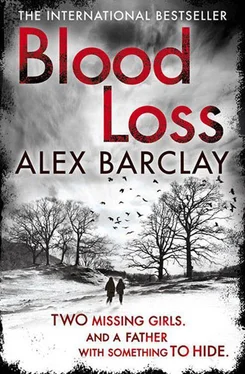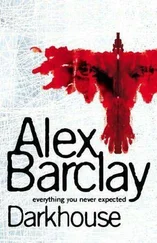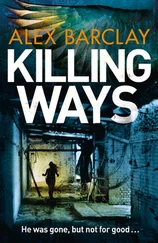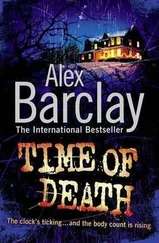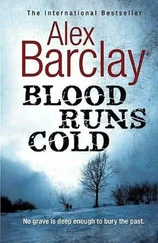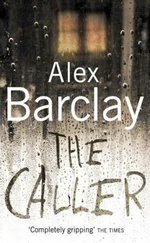Alex Barclay - Blood Loss
Здесь есть возможность читать онлайн «Alex Barclay - Blood Loss» — ознакомительный отрывок электронной книги совершенно бесплатно, а после прочтения отрывка купить полную версию. В некоторых случаях можно слушать аудио, скачать через торрент в формате fb2 и присутствует краткое содержание. Жанр: Триллер, на английском языке. Описание произведения, (предисловие) а так же отзывы посетителей доступны на портале библиотеки ЛибКат.
- Название:Blood Loss
- Автор:
- Жанр:
- Год:неизвестен
- ISBN:нет данных
- Рейтинг книги:4 / 5. Голосов: 1
-
Избранное:Добавить в избранное
- Отзывы:
-
Ваша оценка:
- 80
- 1
- 2
- 3
- 4
- 5
Blood Loss: краткое содержание, описание и аннотация
Предлагаем к чтению аннотацию, описание, краткое содержание или предисловие (зависит от того, что написал сам автор книги «Blood Loss»). Если вы не нашли необходимую информацию о книге — напишите в комментариях, мы постараемся отыскать её.
Blood Loss — читать онлайн ознакомительный отрывок
Ниже представлен текст книги, разбитый по страницам. Система сохранения места последней прочитанной страницы, позволяет с удобством читать онлайн бесплатно книгу «Blood Loss», без необходимости каждый раз заново искать на чём Вы остановились. Поставьте закладку, и сможете в любой момент перейти на страницу, на которой закончили чтение.
Интервал:
Закладка:
Alex Barclay
Blood Loss
Prologue
It was an imprisonment, twice over. Minds captured first by insanity were captured a second time by Kennington Asylum for the Insane. Built in 1904, it was a dignified structure on a salvaged tract of Denver city parkland; mental wellness forged from red bricks and green grass. In appearance, it stood for its promises. But until it became the hollow shell it is today, it never truly reflected them.
In contrast, the grounds were overrun, choked by nature untended, as if the twisted roots of madness, ignored for over a century, were finally unbound.
People had been sent to Kennington to be healed, but when they were captured a third time — by a camera’s lens — they stood in doomed herds, their faces blank, their brains looted. It was clear that the asylum was not a pitstop on a journey to wellness, it was the endpoint of a descent. Their clothes were soiled, their limbs atrophied, their bodies swept into corners like dirt, like something to be thrown away.
CONDEMNED. Even the sign was. The boy stared at it. The Kennington photographs had been taken in 1950, but they had resurfaced sixty years on to be laid bare across eight pages of a Sunday supplement. They had made grown men cry. But the not-so-grown, the high-schoolers … well, the photos made them want to go to that fucked-up place and party with ghosts.
The boy climbed onto the perimeter wall and took a thick black marker from his coat pocket. He gripped the sign with a gloved hand, crossed out the C-O-N and drew an A through the E. DAMNED. Just like a century’s parade of lunatic patients … just like the people inside the building that he had come for tonight. He was yet to know that he would leave without seeing them. And his inadvertent victim, laughing and throwing back shots, dancing through the abandoned wards this Hallowe’en night, was yet to know that her bright ethanol eyes would be haunted hollows by the time the music died.
The boy made his way through the woods that bordered the drive. It was a tangled mess of trees and bushes, and he moved blindly until his boots hit stone. He looked down. There they were — the signs painted onto the ground to lead the way: small, yellow lightning strikes. He followed them around to the back entrance where a huge timber door had hung until its hinges had been unscrewed, until it had been thrown to one side.
Somewhere in the dark distant heart of the building, voices and music pulsed. He paused in the empty doorway. Up ahead, more lightning strikes were drawn on the ground and he began to follow them, moving toward the sound and to where the final symbol was drawn outside the door of the old electroshock therapy room.
He stepped inside. The room seemed filled with giant eyes. He blinked. There was a swamp of people in front of him. He blinked again. They were moving like a mass of maggots. He blinked again. This was not his world. He was sober. They were all drunk, or wild or weakened by illegal drugs. He moved through the crowd, and it swelled against him. A door led off into another room. He was about to go in. Then he saw someone. A girl, standing against a wall, talking to a guy. But her eyes were boring into him , he could feel it like heat. She left the other guy, and walked toward him, and when she got past him, she glanced back, and her smile was like the answer yes. He followed her. She was wearing a black top that was slashed all the way down the back. Her skirt was so short, plaid and pleated. She had black leggings underneath, and boots like his, the tongues out, the laces undone. Her hair was black and shiny and cut into a short bob like a doll’s. A small tattoo was growing like a vine up the center of her neck.
She picked up speed down the hallway, down another, disappearing when she reached the last room. He felt his heart surge. She slid on top of the table at the furthest corner of the room, and her knees were apart. She was smiling at him. His whole body was pounding, not just his head anymore. She opened her mouth to speak, but as he pressed himself against her, he could feel that her whole body was exactly the same way, and he knew that no-one should talk.
It was his first time. He had no idea sex could make you so angry. So, so fucking angry. This is insane. He laughed. This is insane.
He lay there when it was over, staring at the ceiling. They had wound up on the floor. Her hair had come off. It must have been a wig. It was in his hand.
He got up and started to fix his clothes. ‘I gotta go,’ he said.
When he put his hands in his pockets, he could feel the paper. He didn’t need the drawing any more. This had made up for it. She could have it. He crouched down beside her and placed it by her head.
‘Thank you,’ he said. ‘That was awesome.’
As his mouth pressed against her cheek, a small bloody bubble of saliva grew between her lips, and burst.
1
Taber Grace had a slim file on the passenger seat of his car and a cigarette burning down in the ash tray. He was sitting back against the head rest, his bloodshot eyes staring into the dark. He had often thought about sitting in the same position, in his garage, breathing in exhaust fumes through a hose pipe.
Taber Grace was forty-two years old, short and slight. He liked to dress in straight-leg jeans and plain, washed-out shirts, always buttoned to the neck. His hair, thick and brown, fell across one eye. Someone in a bar once joked that it was his private eye. The Private Eye with the private eye. Taber Grace mostly had the sense not to go into bars to listen to drunk talk. He was not a competent drunk. He would recognize the early signs of his drunkenness — the softness around the edge of his vision, the longer search for words — and it was too hard these days to resist being drawn to the dissolution.
After an hour waiting in the dark, watching the snow fall over Denver, Taber Grace knew that his client was not going to show. November 14, evening: it was to have been their second meeting — to see how the client wanted to proceed, based on Taber Grace’s preliminary findings. These meetings were always the same. The client would sit like a prisoner in the electric chair. But the current came from within — the spark of dueling fears as their suspicions were about to be confirmed or dismissed. There was no comfort in either. And there was no comfort for Taber Grace. He had intimate knowledge of his clients, their lives, the lives of those close to them. He was the stranger-witness to their darkest betrayals. They needed this knowledge, they paid him for it, yet they didn’t want him to have it. Each time he delivered it, he could see in their eyes how quickly he became repellent.
Taber Grace had been the bearer of bad news before. It had been part of his first job. Then, like now, it never touched him. It was a practical delivery of information, uncomplicated by emotion. In that job, he had been bound by propriety. He was on time, he spoke politely, he never swore. When he was fired, it became easy to believe that he was what he had always feared he was — just a small-town boy, shoulder to shoulder with his blue-collar buddies, no taller. The problem was that he had never fit into that small-town world and he had run from it as soon as he could.
Taber Grace had liked the mannerly man he became when he left his home town. He liked his new life in Denver. But what he had loved at the start became what he hated at the end, like a failed relationship. The life that came with his job was like a smart overcoat he had carefully put on, that fit perfectly, but gradually began to slip from his shoulders. And he only realized it was gone when the world got very, very cold. And later, when his home did.
Читать дальшеИнтервал:
Закладка:
Похожие книги на «Blood Loss»
Представляем Вашему вниманию похожие книги на «Blood Loss» списком для выбора. Мы отобрали схожую по названию и смыслу литературу в надежде предоставить читателям больше вариантов отыскать новые, интересные, ещё непрочитанные произведения.
Обсуждение, отзывы о книге «Blood Loss» и просто собственные мнения читателей. Оставьте ваши комментарии, напишите, что Вы думаете о произведении, его смысле или главных героях. Укажите что конкретно понравилось, а что нет, и почему Вы так считаете.
